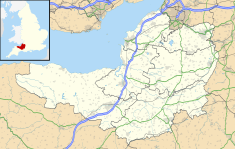King Square, Bridgwater
| King Square | |
|---|---|
 The War Memorial and some of the houses in the square | |
| Location | Bridgwater, Somerset, England |
| Coordinates | 51°07′47″N 3°00′14″W / 51.1296°N 3.0039°WCoordinates: 51°07′47″N 3°00′14″W / 51.1296°N 3.0039°W |
Listed Building – Grade II* | |
 Location of King Square in Somerset | |
King Square in Bridgwater within the English county of Somerset was laid out with large Georgian houses between 1770 and 1800 on the site of Bridgwater Castle. It is also the site of the Bridgwater War Memorial
History[]
The site of King Square was previously occupied by Bridgwater Castle. It was laid out with large Georgian houses between 1770 and 1800.
During the later part of the 17th century John Harvey developed the site of the castle.[1] In 1721 the remains of the castle, the house and the land was sold to James Brydges, 1st Duke of Chandos who developed an industrial centre in the town and demolished the last of the buildings.[2][3][4] Much of the site was built on in the 1720s to create the Georgian Castle Street.[5] In 1734 Chandos sold the whole of the redevelopment area to Thomas Watts, who sold it the following year to John Anderton, whose descendants continued to clear old buildings and construct new ones. King Square was built between 1807 and 1814, with many of the buildings incorporating stone from the old castle, although further study would be needed to say how much of their cellars and foundations are in situ castle walls.[6][2] In 2008, during sewer renovation work, a section of the curtain wall of the castle and a tunnel used to transport goods from the port were discovered.[7][8]
Architecture[]
Bridgwater War Memorial is a Grade II* listed[9] war memorial located on King Square. It was designed by John Angel in the mid-1920s.[10][11] The green figure of the memorial is allegorical,[12] representing "Civilization as a seated female, holding a globe in one hand and with the book of knowledge on her lap."[13]
Number one on the southern side is a house of flemish-bond brick with a Roman tile roof.[14] Numbers One to Seven and eight and nine are part of a terrace with similar construction, listed separately.[15][16] Numbers 10 to 14 are on the east side.[17][18][19][20] Numbers 11 and 12 are on the west side of the square,[18] as is the larger number 24,[21] while 16 and 17 are on the north.[22]
References[]
- ^ Dunning, R.W. "Bridgwater Castle". A History of the County of Somerset: Volume 6: Andersfield, Cannington, and North Petherton Hundreds. British History Online. Retrieved 17 July 2011.
- ^ a b Dunning, Robert (1995). Somerset Castles. Tiverton: Somerset Books. pp. 28–30. ISBN 978-0-86183-278-1.
- ^ Gathercole, Clare. "Bridgwater archaeological survey" (PDF). Somerset County Council. Archived from the original (PDF) on 18 October 2016. Retrieved 15 October 2016.
- ^ Kerr-Peterson, Miles (2013). "The End of Bridgwater Castle" (PDF). SANHS Proceedings. 156: 132.
- ^ Baggs, A.P.; Siraut, M.C. "Bridgwater In: A History of the County of Somerset: Volume 6, andersfield, Cannington, and North Petherton Hundreds (Bridgwater and Neighbouring Parishes)". British History Online. Victoria County History. Retrieved 11 October 2016.
- ^ Kerr-Peterson, Miles (2013). "The End of Bridgwater Castle" (PDF). SANHS Proceedings. 156: 133.
- ^ Beal, James (10 March 2008). ""Outstanding" smugglers tunnel unearthed beneath Castle Street". Bridgwater mercury. Retrieved 8 May 2009.
- ^ "Watching brief (2008), Castle Street, Bridgwater". Somerset Historic Environment Record. Somerset County Council. Retrieved 15 October 2016.
- ^ "World War Memorial, Bridgwater". Listed buildings online. Retrieved 8 September 2012.
- ^ "John Angel". Mapping the Practice and Profession of Sculpture in Britain and Ireland 1851-1951. University of Glasgow History of Art and HATII, online database. 2011. Retrieved 9 September 2012.
- ^ "Sculptor John Angel". Your Archives. Retrieved 6 September 2012.
- ^ "The municipal journal and public works engineer". 35 (1744–1770). Municipal Journal. 1926. Retrieved 8 September 2012. Cite journal requires
|journal=(help) - ^ Borg, Alan (1991). War Memorials: From Antiquity to Present. London: Leo Cooper, Ltd. p. 98. ISBN 085052363X. ISBN 9780850523638.
- ^ "No 1 King Square". National Heritage List for England. Historic England. Retrieved 1 May 2017.
- ^ "Nos.8 AND 9 King Square". National Heritage List for England. Historic England. Retrieved 1 May 2017.
- ^ "Nos.2-7 King Square". National Heritage List for England. Historic England. Retrieved 1 May 2017.
- ^ "No.10 and attached railings King Square". National Heritage List for England. Historic England. Retrieved 1 May 2017.
- ^ a b "Nos.11 AND 12 and attached railings King Square". National Heritage List for England. Historic England. Retrieved 1 May 2017.
- ^ "No.13 and attached railings King Square". National Heritage List for England. Historic England. Retrieved 1 May 2017.
- ^ "No.14 and attached railings King Square". National Heritage List for England. Historic England. Retrieved 1 May 2017.
- ^ "No.24 King Square". National Heritage List for England. Historic England. Retrieved 1 May 2017.
- ^ "Nos.16 AND 17 and attached railings King Square". National Heritage List for England. Historic England. Retrieved 1 May 2017.
- Grade II* listed buildings in Sedgemoor
- Bridgwater
- Streets in Somerset
- Garden squares
